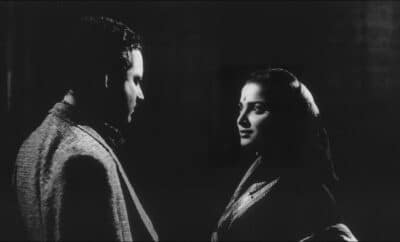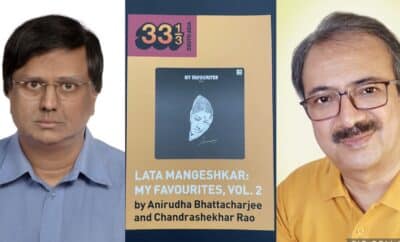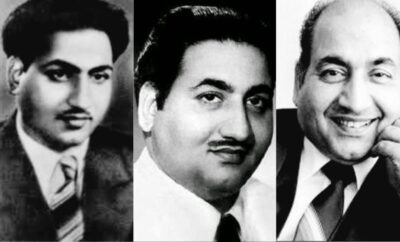Collections
Qamar Jalalabadi – An Underrated Versatile Lyricist
Ask someone to name a few lyricists from the golden era of Hindi film music, and the names like Shailendra, Sahir Ludhianvi, Gulzar, Majrooh Sultanpuri, Hasrat Jaipuri and Anand Bakshi would pop up in no time. All these frontliners have, no doubt, created a colossal body of unforgettable Hindi songs. Yet there are some lyricists, who, in spite of being comparably creative, have never found a place in this front row. Qamar Jalalabadi is one such highly versatile but underrated lyricist.
Born as Om Prakash Bhandari in a Punjabi family on 9th March 1917 in Jalalabad (now in Pakistan) in Punjab, he started displaying a flair for Urdu poetry right from the tender age of seven. Though there was no encouragement from home, Om Prakash soon came to the attention of Amar Chand Amar, a poet in Jalalabad, who recognised the kid’s immense talent and encouraged him to write. He also gave him the penname Qamar (moon). Thus, Amar noticed the glitter of this young Qamar, who he thought would soon shine brightly like a full moon in the firmament of poetry. “Jalalabadi” was added later, following the trend of naming oneself after the hometown, which was then very popular among the Urdu poets.
After completing education, Qamar Jalalabadi started his career as a journalist and worked for several newspapers in Lahore. He also published a film magazine “Star Weekly” from Lahore. His popularity as a poet was increasing day by day. The owner of Pancholi Art Pictures, Dalsukh Pancholi, noticed him and offered him to write the songs for his upcoming film Zameendar (1942). His first song for the film, “Duniya mein gareebon ko aaram nahin milta”, sung by Shamshad Begum, became immensely popular. (The last couple of lines of the song were suggested to Qamar Jalalabadi by another lyricist working with Pancholi Art Pictures, Behzad Lakhnavi.) Thereafter, he got a few more films and his popularity as a lyricist went a few notches up.
Shantaram’s assistant D.D. Kashyap, who was on a tour to Lahore for the release of Prabhat’s film Padosi (1941), heard about Qamar Jalalabadi and brought him and the composer duo Husnlal – Bhagatram to Pune to work for Prabhat. He then wrote songs for a few Prabhat films. One of Prabhat’s films Chand (1944) also marked the beginning of his career as a dialogue writer, after which he went on to pen dialogues for several films.
A partner in Prabhat Film Company, Baburao Pai, left the company and started his own production house “Famous Pictures” in Mumbai. Qamar Jalalabadi and D.D. Kashyap also joined the new company. Qamar Jalalabadi’s songs for some Famous Pictures’ films like Pyar Ki Jeet (1948) and Bari Behen (1949) took him to the zenith of popularity.
Meanwhile, he also wrote songs for some popular films produced by Filmistan, which was newly established then by the people, who had left Bombay Talkies. He was also one of the two lyricists for Noorjahan’s last film released in India – Mirza Sahiban (1947).
His success spree also continued during the 1950s and the 1960s. He worked with almost all the leading composers of the golden era. Though he was active as a lyricist till the 1990s, he reduced his work substantially, perhaps due to the changing dynamics of film music and public taste. In the last phase of his career, he wrote some songs for Sanjay Khan’s Doordarshan serial “Tipu Sultan”.
His versatility was stunning – through his songs, he effortlessly explored various genres, ranging from romantic songs to melancholic songs, comedy songs to philosophical songs and soft songs to cabaret numbers. Very few lyricists could match him in writing comedy songs. His skill in writing comedy songs was so well accepted that he was invited to write just a comedy song or two for a particular film, for which other songs were written by some other lyricist – for example, “Mere Mehboob mujhe tu itna bata, main kunwaara marunga ya shaadi-shuda” (Haseena Maan Jayegi – 1968), “Guni janon re bhakta janon” (Aansoo Aur Muskan – 1970) and “Meri lottery lag jaane waali hai” (Holi Ayee Re – 1970).
He also tried his luck with film production by producing two films – Chhoti Bhabhi (1950) and Aansoo (1953).
After creating a mammoth body of work – 700 songs for more than 150 films and dialogues for more than 40 films – he breathed his last at the age of 85 on 9th January 2003 in Mumbai.
Here are some of his songs that highlight his unparalleled versatility.
1. Wo Paas Rahen Ya Door Rahen (Bari Behen – 1949)
A romantic song saccharinely rendered by Suraiya, composed by Husnlal – Bhagatram, filmed on Suraiya herself, alongside Rehman.
2. Sun Mere Saajna Re (Aansoo – 1953)
A love song sung by Lata Mangeshkar and Mohammed Rafi, with an offbeat tune by Husnlal – Bhagatram. The film was produced by Qamar Jalalabadi himself.
3. Din Hai Suhaana Aaj Pehli Taareekh Hai (Pehli Tarikh – 1954)
This comic relief song, composed by Sudheer Phadke and sung by Kishore Kumar (also filmed on him), became so popular that it turned into a veritable anthem. It would be played on Radio Ceylon on the first of every month. The receipt of monthly salary continues to make the middle-class salaried people very happy even today, and the song remains evergreen.
4. Aaiye Mehrbaan, Baithiye Jaan-E-Jaan (Howrah Bridge – 1958)
An evergreen Asha solo, composed by O.P. Nayyar and filmed on the peerless beauty, Madhubala.
5. Main Baangali Chhokra (Ragini – 1958)
A comic stage song rendered by Asha Bhosle and Kishore Kumar, composed by O.P. Nayyar, filmed on Kishore Kumar and Padmini.
6. Teri Raahon Mein Khade Hain (Chhalia – 1960)
A soulful Lata solo composed by Kalyanji – Anandji for the Raj Kapoor – Nutan starrer film.
7. Ye Kaisi Ajab Dastaan Ho Gayi Hai (Rustam Sohrab – 1963)
Suraiya’s swan song from her last film, composed by Sajjad Hussain and filmed on Suraiya herself, alongside Prithviraj Kapoor.
8. Phir Aane Laga Yaad Wahi (Ye Dil Kisko Doon – 1963)
A romantic duet sung by Mohammed Rafi and Usha Khanna under Iqbal Qureshi’s baton, filmed on Shashi Kapoor and Ragini.
9. Donon Ne Kiya Tha Pyaar Magar (Mahua – 1969)
A soulful Rafi solo, composed by Sonik – Omi.
10. Dekho Dekho Tum (Nischay – 1992)
A romantic song sung by Amit Kumar and Kavita Krishnamurti under O.P. Nayyar’s baton, filmed on Salman Khan and Karishma Kapoor.




Hari pal Sinha chhabra
March 9, 2024 at 10:01 pm
Outstanding